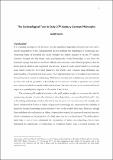The eschatological turn in German philosophy
Abstract
This article argues that modern European philosophy was significantly shaped by the transposition of eschatology from a theological into a philosophical register. By ‘eschatology’, I here mean thought about the ‘last things’ as they relate to present systems of life and action; and about those systems as determined, at least in part, by their end. I take as my starting point the claim that the scepticism regarding revelation that was such a central characteristic of the Enlightenment did not eradicate the importance of eschatology as a structuring frame of historical and moral thought, but merely changed it. Modern theologians and philosophers tended to shift the ground of eschatology from revelation to the inner logic of a system; eschatology was seen as legitimated by, and in turn legitimating, the shape of a given philosophical account of history. The questions and challenges arising from this shift were important drivers of early twentieth‐century European philosophy. This article works out this claim through indicative accounts of several large debates of early twentieth‐century philosophies of history and of politics as contestations about the meaning of eschatology: the crisis of historicism, the rise of existentialism, and the surge of political religions. It concludes with a discussion of Martin Heidegger’s eschatological thought of the 1930s, illuminated by the recent publication of his Black Notebooks.
Citation
Wolfe , J 2019 , ' The eschatological turn in German philosophy ' , Modern Theology , vol. 35 , no. 1 , pp. 55-70 . https://doi.org/10.1111/moth.12460
Publication
Modern Theology
Status
Peer reviewed
ISSN
0266-7177Type
Journal article
Description
The author thanks the University of St Andrews and the J. & A. Deas Fund for supporting this research.Collections
Items in the St Andrews Research Repository are protected by copyright, with all rights reserved, unless otherwise indicated.

